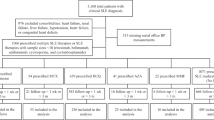Abstract
Hydroxychloroquine (HCQ), an antimalarial drug, is recommended for all patients with systemic lupus erythematosus (SLE), and is widely used around the world. HCQ has various beneficial effects, including antidiabetic effects but was unavailable in Japan until gaining approval for SLE treatment in 2015. We present herein the cases of two Japanese women with SLE and diabetes mellitus (DM) who were treated using HCQ and achieved reductions in glycosylated hemoglobin (HbA1c). A 48 year-old Japanese woman with SLE and DM (patient 1) received oral HCQ at 200 mg/day for the treatment of lupus nephritis. HbA1c levels decreased from 7.2–6.2% after 14 months of HCQ without any loss of body weight or alterations in doses of glucocorticoid or hypoglycemic agents. A 64 year-old Japanese woman with SLE and DM (patient 2) received oral HCQ at 200 mg and 400 mg on alternate days for the treatment of erythema. She also received intensive insulin therapy. HCQ drastically reduced both HbA1c levels, from 10.3 to 7.5%, and the insulin doses required without altering the doses of glucocorticoid or hypoglycemic agents, although body weight increased slightly. No episodes of hypoglycemia were seen in either patient. HCQ can achieve antidiabetic effects in Japanese SLE patients.

Similar content being viewed by others
References
Fanouriakis A, Kostopoulou M, Alunno A, Aringer M, Bajema I, Boletis JN, et al. 2019 update of the EULAR recommendations for the management of systemic lupus erythematosus. Ann Rheum Dis. 2019;78:736–45.
Thong B, Olsen NJ. Systemic lupus erythematosus diagnosis and management. Rheumatology. 2017. https://doi.org/10.1093/rheumatology/kew401.
Kishimoto M, Deshpande GA, Yokogawa N, Buyon JP, Okada M. Use of hydroxychloroquine in Japan. J Rheumatol. 2012;39:1296.
Yokogawa N, Eto H, Tanikawa A, Ikeda T, Yamamoto K, Takahashi T, et al. Effects of hydroxychloroquine in patients with cutaneous lupus erythematosus: a multicenter, double-blind, randomized, parallel-group trial. Arthritis Rheumatol. 2017;69:791–9.
Wasko MC, Hubert HB, Lingala VB, Elliott JR, Luggen ME, Fries JF, et al. Hydroxychloroquine and risk of diabetes in patients with rheumatoid arthritis. JAMA. 2007;298:187–93.
Solomon DH, Garg R, Lu B, Todd DJ, Mercer E, Norton T, et al. Effect of hydroxychloroquine on insulin sensitivity and lipid parameters in rheumatoid arthritis patients without diabetes mellitus: a randomized, blinded crossover trial. Arthritis Care Res. 2014;66:1246–51.
Sharma TS, Wasko MC, Tang X, Vedamurthy D, Yan X, Cote J, et al. Hydroxychloroquine use is associated with decreased incident cardiovascular events in rheumatoid arthritis patients. J Am Heart Assoc. 2016. https://doi.org/10.1161/JAHA.115.002867.
Penn SK, Kao AH, Schott LL, Elliott JR, Toledo FG, Kuller L, et al. Hydroxychloroquine and glycemia in women with rheumatoid arthritis and systemic lupus erythematosus. J Rheumatol. 2010;37:1136–42.
Chen YM, Lin CH, Lan TH, Chen HH, Chang SN, Chen YH, et al. Hydroxychloroquine reduces risk of incident diabetes mellitus in lupus patients in a dose-dependent manner: a population-based cohort study. Rheumatology. 2015;54:1244–9.
Cansu DU, Korkmaz C. Hypoglycaemia induced by hydroxychloroquine in a non-diabetic patient treated for RA. Rheumatology. 2008;47:378–9.
Weening JJ, D’Agati VD, Schwartz MM, Seshan SV, Alpers CE, Appel GB, et al. The classification of glomerulonephritis in systemic lupus erythematosus revisited. Kidney Int. 2004. https://doi.org/10.1097/01.asn.0000108969.21691.5d.
Petri M, Kim MY, Kalunian KC, Grossman J, Hahn BH, Sammaritano LR, et al. Combined oral contraceptives in women with systemic lupus erythematosus. N Engl J Med. 2005;353:2550–8.
Mercer E, Rekedal L, Garg R, Lu B, Massarotti EM, Solomon DH. Hydroxychloroquine improves insulin sensitivity in obese non-diabetic individuals. Arthritis Res Ther. 2012;14:R135.
Wasko MC, McClure CK, Kelsey SF, Huber K, Orchard T, Toledo FG. Antidiabetogenic effects of hydroxychloroquine on insulin sensitivity and beta cell function: a randomised trial. Diabetologia. 2015;58:2336–43.
Rekedal LR, Massarotti E, Garg R, Bhatia R, Gleeson T, Lu B, et al. Changes in glycosylated hemoglobin after initiation of hydroxychloroquine or methotrexate treatment in diabetes patients with rheumatic diseases. Arthritis Rheum. 2010;62:3569–73.
Wondafrash DZ, Desalegn TZ, Yimer EM, Tsige AG, Adamu BA, Zewdie KA. Potential effect of hydroxychloroquine in diabetes mellitus: a systematic review on preclinical and clinical trial studies. J Diabetes Res. 2020. https://doi.org/10.1155/2020/5214751.
Plantone D, Koudriavtseva T. Current and future use of chloroquine and hydroxychloroquine in infectious, immune, neoplastic, and neurological diseases: a mini-review. Clin Drug Investig. 2018;38:653–71.
Hage MP, Al-Badri MR, Azar ST. A favorable effect of hydroxychloroquine on glucose and lipid metabolism beyond its anti-inflammatory role. Ther Adv Endocrinol Metab. 2014;5:77–85.
Wallace DJ, Gudsoorkar VS, Weisman MH, Venuturupalli SR. New insights into mechanisms of therapeutic effects of antimalarial agents in SLE. Nat Rev Rheumatol. 2012;8:522–33.
Nishimoto S, Fukuda D, Sata M. Emerging roles of Toll-like receptor 9 in cardiometabolic disorders. Inflamm Regen. 2020;40:18.
Liu M, Peng J, Tai N, Pearson JA, Hu C, Guo J, et al. Toll-like receptor 9 negatively regulates pancreatic islet beta cell growth and function in a mouse model of type 1 diabetes. Diabetologia. 2018;61:2333–43.
Escárcega RO, García-Carrasco M, Fuentes-Alexandro S, Jara LJ, Rojas-Rodriguez J, Escobar-Linares LE, et al. Insulin resistance, chronic inflammatory state and the link with systemic lupus erythematosus-related coronary disease. Autoimmun Rev. 2006;6:48–53.
Ozen G, Pedro S, Holmqvist ME, Avery M, Wolfe F, Michaud K. Risk of diabetes mellitus associated with disease-modifying antirheumatic drugs and statins in rheumatoid arthritis. Ann Rheum Dis. 2017;76:848–54.
Acknowledgements
We gratefully acknowledge the work of past and present members of our department.
Author information
Authors and Affiliations
Corresponding author
Ethics declarations
Conflict of interest
The authors state that they have no conflicts of interest.
Informed consent
Written informed consent was obtained from the patient by the corresponding author. The signed consent forms are retained by the corresponding author. We anonymized the patient’s details as much as possible.
Additional information
Publisher's Note
Springer Nature remains neutral with regard to jurisdictional claims in published maps and institutional affiliations.
About this article
Cite this article
Hanai, S., Kobayashi, Y., Ichijo, M. et al. Antidiabetic effects of hydroxychloroquine in two Japanese patients with systemic lupus erythematosus. Diabetol Int 13, 447–451 (2022). https://doi.org/10.1007/s13340-021-00544-z
Received:
Accepted:
Published:
Issue Date:
DOI: https://doi.org/10.1007/s13340-021-00544-z




